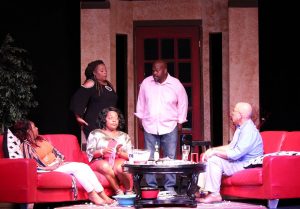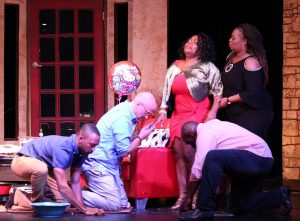‘Rancho Mirage’ is stark excoriation of social artifices by which we all live
 Steven Dietz’s Rancho Mirage opened on June 14 at the Alliance for the Arts. It’s a fast-paced, psychologically complex work that earned the playwright a 2013 Edgerton Foundation New American Plays award (although only a modicum of critical acclaim). But what emerges from Anne Dodd’s careful direction is an interesting revelation: there is typically a wide chasm between the persona we project to our friends, co-workers and even our families
Steven Dietz’s Rancho Mirage opened on June 14 at the Alliance for the Arts. It’s a fast-paced, psychologically complex work that earned the playwright a 2013 Edgerton Foundation New American Plays award (although only a modicum of critical acclaim). But what emerges from Anne Dodd’s careful direction is an interesting revelation: there is typically a wide chasm between the persona we project to our friends, co-workers and even our families  and the person we actually are. And this is not a mere matter of vanity, but a necessary prevarication if our relationships are to survive.
and the person we actually are. And this is not a mere matter of vanity, but a necessary prevarication if our relationships are to survive.
Dietz’s insight crosses all ethnic, religious and demographic divides, but in order to allow his audiences to appreciate this dynamic, he makes the characters in his play affluent professionals (10-percenters)  who live in an insular gated enclave appropriately called Rancho Mirage. It’s as if Dietz believes his message will be better received if it doesn’t appear to strike too close to home.
who live in an insular gated enclave appropriately called Rancho Mirage. It’s as if Dietz believes his message will be better received if it doesn’t appear to strike too close to home.
And in this vein, Dietz gives us Nick and Diane Dahner, played by Rob Green and Tijuanna Clemons. The Dahners are hosting a dinner party for two other couples in their lavish House & Gardens home that boasts a panoramic view of Rancho Mirage’s beautiful artificial lake. Speaking of artificial, we  quickly discover that it’s not only going to be the last party the Dahners ever throw in the house, but the last night they’ll spend there as well. They’re bankrupt and the house is going up on the auction block in the morning.
quickly discover that it’s not only going to be the last party the Dahners ever throw in the house, but the last night they’ll spend there as well. They’re bankrupt and the house is going up on the auction block in the morning.
But they haven’t shared this news with their close friends, Pam and Charlie Caldwell or Louise Parker and Trevor Neese.  To the contrary, they’ve taken great pains to preserve their carefully-constructed pretense of affluence and success, complete with a drink cart filled with $30 bottles of wine. To be fair, though, Diane didn’t know until quite recently that they were on the brink of financial ruin. Nick’s persona was so important to him that he couldn’t even let his own wife in on the reality that his architectural business had dwindled to the point
To the contrary, they’ve taken great pains to preserve their carefully-constructed pretense of affluence and success, complete with a drink cart filled with $30 bottles of wine. To be fair, though, Diane didn’t know until quite recently that they were on the brink of financial ruin. Nick’s persona was so important to him that he couldn’t even let his own wife in on the reality that his architectural business had dwindled to the point  where he could no longer maintain their lavish lifestyle.
where he could no longer maintain their lavish lifestyle.
Interestingly, Nick Dahner is a rank amateur when it comes to keeping secrets from his wife. Charlie Caldwell (played by Nuniez Philor) is about to spring a real doozy on his unsuspecting wife and friends. Using signatures he pilfered from his friends on forged letters of recommendation, he’s received the go-ahead to adopt two Eastern European orphans, one who suffers from fetal alcohol syndrome  and the other who lost a foot after stepping on a land mine. Charlie doesn’t just want to become a dad in the worst possible way. It’s his way of helping his wife (played by Carolyn Greene) recover the faith in God and people that she lost after a couple at her church bilked their fellow parishioners out of more than $50,000 in a fake adoption scheme.
and the other who lost a foot after stepping on a land mine. Charlie doesn’t just want to become a dad in the worst possible way. It’s his way of helping his wife (played by Carolyn Greene) recover the faith in God and people that she lost after a couple at her church bilked their fellow parishioners out of more than $50,000 in a fake adoption scheme.
Not to be outdone,  Louise and Trevor (played respectively by real-life couple Sonya and Cicero McCarter) have been leading their friends to believe that they’re deliriously happy when, in fact, they’re separated and on the verge of divorce.
Louise and Trevor (played respectively by real-life couple Sonya and Cicero McCarter) have been leading their friends to believe that they’re deliriously happy when, in fact, they’re separated and on the verge of divorce.
As the evening progresses, these and many other secrets come tumbling out – aided, no doubt, by a copious amount of fine wine consumed on an empty stomach. And as their carefully-cultivated pretenses begin tumbling over like dominoes toppled in a  chain reaction, these six friends begin speaking their minds without resort to the white lies and social decorum they’ve used at length to spare each other’s feelings and avoid piercing each person’s psychological armor and façade.
chain reaction, these six friends begin speaking their minds without resort to the white lies and social decorum they’ve used at length to spare each other’s feelings and avoid piercing each person’s psychological armor and façade.
This is as mesmerizing and uncomfortable for the audience to watch as it is for the Dahners, Parker/Neeses and Caldwells, but that’s clearly Dietz’s intent.  Once you look into a garage or closet and find it empty, the illusion dissipates and it becomes impossible to maintain the mirage. But is this a better way to communicate and relate to one another? Is it even possible? Do we dare reveal ourselves as innately petty and superficial beings, or is it a
Once you look into a garage or closet and find it empty, the illusion dissipates and it becomes impossible to maintain the mirage. But is this a better way to communicate and relate to one another? Is it even possible? Do we dare reveal ourselves as innately petty and superficial beings, or is it a  necessity that we lead others to believe and have them accept that we’re better than we really are?
necessity that we lead others to believe and have them accept that we’re better than we really are?
In 1927, Sigmund Freud wrote an interesting treatise (The Future of Illusion) in which he posited that if there were no prohibitions against acting to satisfy  one’s instinctual needs, life might be more exciting but such actions would quickly bring about a perpetual state of conflict, perhaps even death and the destruction of civilization. For the better part of two hours, Steven Dietz in Rancho Mirage shows us what it might be like if people spoke honestly and said what’s on their mind without a social filter. True, their relationships would be more honest, exciting and genuine,
one’s instinctual needs, life might be more exciting but such actions would quickly bring about a perpetual state of conflict, perhaps even death and the destruction of civilization. For the better part of two hours, Steven Dietz in Rancho Mirage shows us what it might be like if people spoke honestly and said what’s on their mind without a social filter. True, their relationships would be more honest, exciting and genuine,  but the friendships might be unlikely to endure.
but the friendships might be unlikely to endure.
Or is there a way to say what you really think and believe nicely – in a way that doesn’t eviscerate or cut to the quick?
Enter the babysitter, played by Eren Sisk. With the innocence of youth, she meekly and sweetly tells the Dahners that the  reason she quit babysitting for them is because they’ve stiffed her to the tune of $374 over the previous couple of months and that she’s come for her money and isn’t leaving without it. And she sets the record straight with Louise Parker, who thinks her husband has been sexually involved with the under-aged teen to settle the score in connection with Louise’s own
reason she quit babysitting for them is because they’ve stiffed her to the tune of $374 over the previous couple of months and that she’s come for her money and isn’t leaving without it. And she sets the record straight with Louise Parker, who thinks her husband has been sexually involved with the under-aged teen to settle the score in connection with Louise’s own  improprieties.
improprieties.
Admittedly, this analysis is an outlier. Other reviewers have postulated that Rancho Mirage is actually a dark “comedy about horrible people and the catastrophes that befall them [that morphs] into a drama about flawed buy human characters – like us, but a little worse – who are searching to rediscover their hearts” (Tim Treanor, DC Theatre Scene, 10- 1-2013), a “comedy that borders on farce” (Dominic P. Papatola, Twin Cities Pioneer Press, 11-9-2013) or a satire of “the corrupt core of American affluence” (Elizabeth Bruce, MD Theatre Guide, 10-3-2013). And perhaps Rancho Mirage is all of this, and more. But as unfolding on the Foulds Theatre stage at the Alliance for the Arts, it is also – or perhaps most of all – a stark
1-2013), a “comedy that borders on farce” (Dominic P. Papatola, Twin Cities Pioneer Press, 11-9-2013) or a satire of “the corrupt core of American affluence” (Elizabeth Bruce, MD Theatre Guide, 10-3-2013). And perhaps Rancho Mirage is all of this, and more. But as unfolding on the Foulds Theatre stage at the Alliance for the Arts, it is also – or perhaps most of all – a stark  excoriation of the social artifices by which we all live and the illusions by which we want the world to know and judge us.
excoriation of the social artifices by which we all live and the illusions by which we want the world to know and judge us.
But there is more to Theatre Conspiracy’s production of this award-winning play.
There is superlative acting from each of the Rancho Mirage cast members, who’ve had to endure their own trials and tribulations to bring local audiences  the biting critiques and snappy repartee that plays out like staccato fireworks on the Fourth of July.
the biting critiques and snappy repartee that plays out like staccato fireworks on the Fourth of July.
It would be patently unfair to single out one actor over another. They all turn in good, tight performances. But it’s the women in this play who are given the sharpest lines and utterances, and they certainly let the  claws come out as they become more and more catty over the course of the evening. While the men seem to enjoy a closer affinity, it’s just a good damn thing for them that they don’t find themselves locked in a freezer. Wait a minute, that’s been done already in The Smell of the Kill.
claws come out as they become more and more catty over the course of the evening. While the men seem to enjoy a closer affinity, it’s just a good damn thing for them that they don’t find themselves locked in a freezer. Wait a minute, that’s been done already in The Smell of the Kill.
With Rancho Mirage, Director Anne Dodd has given us all something meaty to chew on. And that, of course, is the goal of good theater. And it also bears noting  that she has cast five African-American actors in a play that, heretofore, has always been staged with an all-Caucasian cast. But that’s Anne Dodd being Anne Dodd. She’s a smart, savvy director known for thinking outside of the box. Unfortunately, Rancho Mirage represents Dodd’s swan song. She and husband Patrick Day are relocating to Charlotte, North Carolina. They will be sorely
that she has cast five African-American actors in a play that, heretofore, has always been staged with an all-Caucasian cast. But that’s Anne Dodd being Anne Dodd. She’s a smart, savvy director known for thinking outside of the box. Unfortunately, Rancho Mirage represents Dodd’s swan song. She and husband Patrick Day are relocating to Charlotte, North Carolina. They will be sorely  missed.
missed.
June 17, 2019.
RELATED POSTS.
- ‘Rancho Mirage’ asks what remains when youth, dreams and the last bottle of wine are gone
- ‘Rancho Mirage’ play dates, times and ticket info
- Spotlight on ‘Rancho Mirage’ actor Rob Green
- Spotlight on ‘Rancho Mirage’ actor Carolyn Greene
 Spotlight on ‘Rancho Mirage’ actor Cicero McCarter
Spotlight on ‘Rancho Mirage’ actor Cicero McCarter- Spotlight on ‘Rancho Mirage’ actor Sonya McCarter
- Spotlight on ‘Rancho Mirage’ actor Nuniez Philor
- Spotlight on ‘Rancho Mirage’ actor Eren Sisk














 Tom Hall is both an amateur artist and aspiring novelist who writes art quest thrillers. He is in the final stages of completing his debut novel titled "Art Detective," a story that fictionalizes the discovery of the fabled billion-dollar Impressionist collection of Parisian art dealer Josse Bernheim-Jeune, thought by many to have perished during World War II when the collection's hiding place, Castle de Rastignac in southern France, was destroyed by the Wehrmacht in reprisal for attacks made by members of the Resistance operating in the area. A former tax attorney, Tom holds a bachelor's degree as well as both a juris doctorate and masters of laws in taxation from the University of Florida. Tom lives in Estero, Florida with his fiancee, Connie, and their four cats.
Tom Hall is both an amateur artist and aspiring novelist who writes art quest thrillers. He is in the final stages of completing his debut novel titled "Art Detective," a story that fictionalizes the discovery of the fabled billion-dollar Impressionist collection of Parisian art dealer Josse Bernheim-Jeune, thought by many to have perished during World War II when the collection's hiding place, Castle de Rastignac in southern France, was destroyed by the Wehrmacht in reprisal for attacks made by members of the Resistance operating in the area. A former tax attorney, Tom holds a bachelor's degree as well as both a juris doctorate and masters of laws in taxation from the University of Florida. Tom lives in Estero, Florida with his fiancee, Connie, and their four cats.